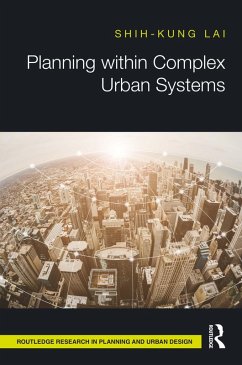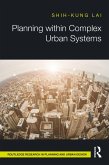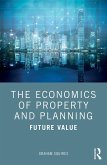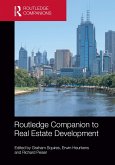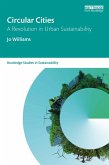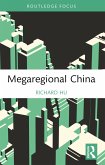Dieser Download kann aus rechtlichen Gründen nur mit Rechnungsadresse in A, B, BG, CY, CZ, D, DK, EW, E, FIN, F, GR, HR, H, IRL, I, LT, L, LR, M, NL, PL, P, R, S, SLO, SK ausgeliefert werden.
"There is little doubt that cities are complex systems but so is the process of planning. What Shih-Kung Lai manages to do in this book is weave the themes of complexity in cities and complexity in planning into one another. Using simple algebras, he develops methods and experiments to build an all-encompassing approach to how we should plan our cities. Important reading for all those concerned with how we go about exploring our urban future." Michael Batty, CASA, University College London
"The book has made a strong case for the importance of reviving planning theory to understand the interactions between planning and complex urban systems. Planners are passionate about using their knowledge and skills to help the creation, development, and transformation of cities for improved quality of life, better environments, and a sustainable future. They assume the noble responsibility of being the guardians of present and future generations... Lai proposes a way to develop planning theory that helps to explore the natural order of complex urban systems and to make plans with the order. I highly recommend this book for readers who are committed to improving the efficiency and effectiveness of Planning within Complex Urban Systems." Journal of Urban Affairs, February 2022, Volume 44, Issue 2
"Building on the Illinois School of thinking about plans, in this book Shih-Kung Lai demonstrates through deductive logic and human/machine experiments why planning within complex urban systems is a phenomenon that is worth exploring. In particular, he is able to synthesize his work on urban complexity and planning behavior during the past 35 years into a coherent framework that convincingly depicts the relationship among complexity theory, urban complexity, the four I's, the logic of making plans, planning behavior, and plans. A must-read for academic and practicing planners who are interested in a behavioral approach to planning within complex urban systems." Gerrit-Jan Knaap, Executive Director and Professor, National Center for Smart Growth Research and Education at the University of Maryland
"This is an incredible book. It argues that traditional urban science is so inadequate due its selective and top down approach that it should be replaced by this book's comprehensive, complexity-acknowledging, molecular and bottom-up approach. Such a claim is debateable, but it certainly prompts deeper thinking about the epistemology of urban planning.
Another plus is Shih-Kung Lai's vast knowledge of the methods and related fields that have surrounded urban planning over the last seventy odd years - graph theory, symbolic algebra, cellular automata, decision science, game theory, artificial intelligence and entropy modelling to name but a few. It means that this book can also function as an anthology of urban management methods, all of which have been comprehensively referenced." Ray Wyatt, University of Melbourne, for Journal of Urban Management, March 2022

